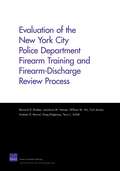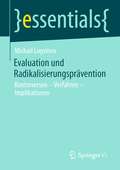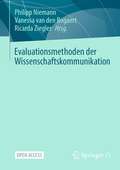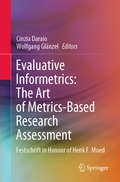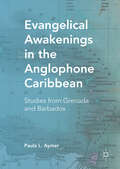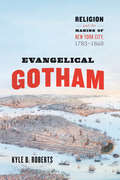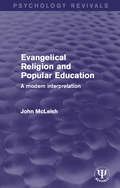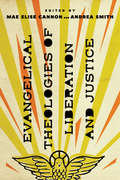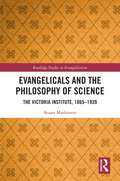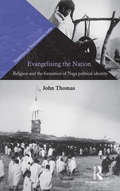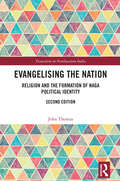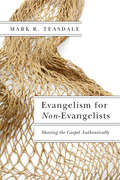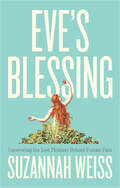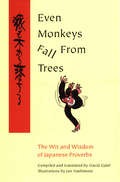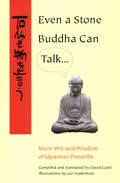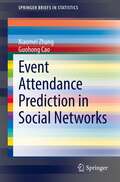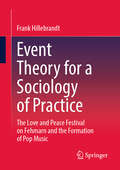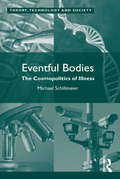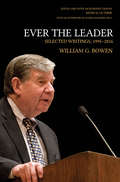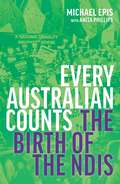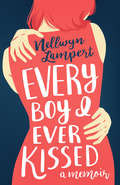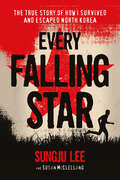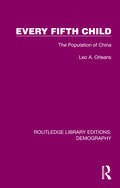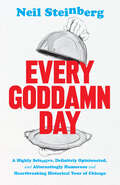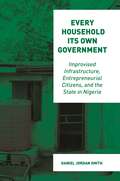- Table View
- List View
Evaluation of the New York City Police Department Firearm Training and Firearm-Discharge Review Process
by Bernard D. Rostker Andrew R. Morral Carl Jensen William M. Hix Lawrence M. HanserIn January 2007, New York City Police Commissioner Raymond W. Kelly asked the RAND Corporation to examine the quality and completeness of the New York City Police Department's firearm-training program and identify potential improvements in it and in the police department's firearm-discharge review process. This monograph reports the observations, findings, and recommendations of that study.
Evaluation und Radikalisierungsprävention: Kontroversen – Verfahren – Implikationen (essentials)
by Michail LogvinovDieses essential befasst sich mit Paradigmen und Verfahren der Evaluation und schlägt einen Bogen zu aktuellen Kontroversen rund um das Thema „Evaluationsansätze in der Radikalisierungsprävention“. Michail Logvinov zeichnet Defizite der Evidenzschaffung nach und formuliert Vorschläge für die Wissenschaft und Praxis. Darüber hinaus plädiert er für eine Intensivierung des Wissenstransfers zwischen der Evaluationsforschung und Fachpraxis mit dem Ziel, gegenstandsadäquate wirkungsorientierte Evaluationsdesigns zu entwickeln und zu testen.
Evaluationsmethoden der Wissenschaftskommunikation
by Philipp Niemann Vanessa van den Bogaert Ricarda ZieglerDies ist ein Open-Access-Buch.Akteure und Fördergeber von Wissenschaftskommunikation beschäftigt zunehmend die Frage, welche Wirkungen von ihren Aktivitäten tatsächlich ausgehen und ob sie ihre Ziele damit eigentlich erreichen. Wer liest das Weblog eines Forschungsprojekts? Ändert der Besuch eines Science-Slams nachhaltig den Blick des Publikums auf Wissenschaft? Wie zufrieden sind die Beteiligten mit einer Diskussionsveranstaltung? Der Band bietet einen Überblick über wissenschaftliche Designs und Methoden zur Evaluation von Wissenschaftskommunikation. Er vereint dabei sowohl quantitative als auch qualitative Zugänge, Forschung und Praxis, und beleuchtet das Thema aus unterschiedlichen disziplinären Perspektiven.
Evaluative Informetrics: Festschrift in Honour of Henk F. Moed
by Wolfgang Glänzel Cinzia DaraioWe intend to edit a Festschrift for Henk Moed combining a “best of” collection of his papers and new contributions (original research papers) by authors having worked and collaborated with him. The outcome of this original combination aims to provide an overview of the advancement of the field in the intersection of bibliometrics, informetrics, science studies and research assessment.
Evangelical Awakenings in the Anglophone Caribbean
by Paula L. AymerThis book examines the evangelical Christian worship focusing primarily in the island-state of Grenada. The study is based upon the author's detailed study of Pentecostal communities in that island-state as well as her own background in Barbados. The study traces the development of Pentecostal religious communities from Eighteenth- and Nineteenth-Century Wesleyan Methodist movement.
Evangelical Gotham: Religion and the Making of New York City, 1783-1860
by Kyle B. RobertsAt first glance, evangelical and Gotham seem like an odd pair. What does a movement of pious converts and reformers have to do with a city notoriously full of temptation and sin? More than you might think, says Kyle B. Roberts, who argues that religion must be considered alongside immigration, commerce, and real estate scarcity as one of the forces that shaped the New York City we know today. In Evangelical Gotham, Roberts explores the role of the urban evangelical community in the development of New York between the American Revolution and the Civil War. As developers prepared to open new neighborhoods uptown, evangelicals stood ready to build meetinghouses. As the city's financial center emerged and solidified, evangelicals capitalized on the resultant wealth, technology, and resources to expand their missionary and benevolent causes. When they began to feel that the city's morals had degenerated, evangelicals turned to temperance, Sunday school, prayer meetings, antislavery causes, and urban missions to reform their neighbors. The result of these efforts was Evangelical Gotham--a complicated and contradictory world whose influence spread far beyond the shores of Manhattan. Winner of the 2015 Dixon Ryan Fox Manuscript Prize from the New York State Historical Association
Evangelical Religion and Popular Education: A Modern Interpretation (Psychology Revivals)
by John McLeishUnder the influence of the evangelical movement in the 18th and early 19th centuries education, in one form or another, was brought to a vast number of people in England and Wales. Originally published in 1969, it is this phenomenon that forms the subject of Dr McLeish’s book. The two central figures are Griffith Jones and Hannah More and the movements are seen almost entirely through their work. Dr McLeish examines the nature and aims of the schools which were established; their economics and organisation; their progress and achievement; the social background in which they flourished. In the second part of his book Dr McLeish attempts a bold synthesis. He analyses these data in light of four essentially modern social theories – Marxist dialectics, the functionalist anthropology of Malinowski, Freudian psychoanalysis, and the sociology of Talcott Parsons. The author does not pretend to provide all the answers. What he suggests is a way of looking at history that is open-minded and eclectic and vitalizing in the perspectives which it offers.
Evangelical Theologies of Liberation and Justice
by Mae Elise CannonFor many evangelicals, liberation theology seems a distant notion. Some might think it is antithetical to evangelicalism, while others simply may be unfamiliar with the role evangelicals have played in the development of liberation theologies and their profound effect on Latin American, African American, and other global subaltern Christian communities. Despite the current rise in evangelicals focusing on justice work as an element of their faith, evangelical theologians have not adequately developed a theological foundation for this kind of activism. Evangelical Theologies of Liberation and Justice fills this gap by bringing together the voices of academics, activists, and pastors to articulate evangelical liberation theologies from diverse perspectives. Through critical engagement, these contributors consider what liberation theology and evangelical tenets of faith have to offer one another. Evangelical thinkers—including Soong-Chan Rah, Chanequa Walker-Barnes, Robert Chao Romero, Paul Louis Metzger, and Alexia Salvatierra—survey the history and outlines of liberation theology and cover topics such as race, gender, region, body type, animal rights, and the importance of community. Scholars, students, and churches who seek to engage in reflection and action around issues of biblical justice will find here a unique and insightful resource. Evangelical Theologies of Liberation and Justice opens a conversation for developing a specifically evangelical view of liberation that speaks to the critical justice issues of our time.
Evangelicals and the Philosophy of Science: The Victoria Institute, 1865-1939 (Routledge Studies in Evangelicalism)
by Stuart MathiesonThis book investigates the debates around religion and science at the influential Victoria Institute. Founded in London in 1865, and largely drawn from the evangelical wing of the Church of England, it had as its prime objective the defence of ‘the great truths revealed in Holy Scripture’ from ‘the opposition of science, falsely so called’. The conflict for them was not between science and religion directly, but what exactly constituted true science. Chapters cover the Victoria Institute’s formation, its heyday in the late nineteenth century, and its decline in the years following the First World War. They show that at stake was more than any particular theory; rather, it was an entire worldview, combining theology, epistemology, and philosophy of science. Therefore, instead of simply offering a survey of religious responses to evolutionary theory, this study demonstrates the complex relationship between science, evangelical religion, and society in the years after Darwin’s Origin of Species. It also offers some insight as to why conservative evangelicals did not display the militancy of some American fundamentalists with whom they shared so many of their intellectual commitments. Filling in a significant gap in the literature around modern attitudes to religion and science, this book will be of keen interest to scholars of Religious Studies, the History of Religion, and Science and Religion.
Evangelising the Nation: Religion and the Formation of Naga Political Identity (Transition in Northeastern India)
by John ThomasNortheast India has witnessed several nationality movements during the 20th century. The oldest and one of the most formidable has been that of the Nagas — inhabiting the hill tracts between the Brahmaputra river in India and the Chindwin river in Burma (now Myanmar). Rallying behind the slogan, ‘Nagaland for Christ’, this movement has been the site of an ambiguous relation between a particular understanding of Christianity and nation-making. This book, based on meticulous archival research, traces the making of this relation and offers fresh perspectives on the workings of religion in the formation of political and cultural identities among the Nagas. It tracks the transmutations of Protestantism from the United States to the hill tracts of Northeast India, and its impact on the form and content of the nation that was imagined and longed for by the Nagas. The volume also examines the role of missionaries, local church leaders, and colonial and post-colonial states in facilitating this process. Lucidly written and rigorous in its analyses, this book will be of interest to scholars and researchers of South Asian history, religion, political science, sociology and social anthropology, and particularly those concerned with Northeast India.
Evangelising the Nation: Religion and the Formation of Naga Political Identity (Transition in Northeastern India)
by John ThomasEvangelising the Nation examines the extent to which a particular articulation of Christianity mediated the formation of national identity among the Nagas who inhabit the hill tracts between the Brahmaputra River in India and the Chindwin River in Burma (now Myanmar). This revised second edition revisits the defining attributes of this process and brings to forefront the agential role of religion in shaping modern political identities.This book, based on meticulous archival research, tracks the transmutations of Protestantism from the United States to the hill tracts of Northeast India, and its impact on the form and content of the nation that was imagined and longed for by the Nagas. It also examines how missionaries, local church leaders, and the colonial and post-colonial state mediated nationalist aspirations among the Nagas during the twentieth century.Part of Transitions in Northeastern India series, this lucidly written book will be of interest to scholars and researchers of South Asian history, religion, political science, sociology and social anthropology, and particularly those concerned with Northeast India.
Evangelism for Non-Evangelists: Sharing the Gospel Authentically
by Mark R. TeasdaleWe have met evangelists—and they are not us. Sympathetic to the discomfort his students have about evangelism, Mark Teasdale gives us this refreshing, practical look at sharing the good news. He opens up a nonthreatening space, helping us learn how to express the gospel in a manner true to what we believe, authentic to who we are, and compelling to others.
Eve's Blessing: Uncovering the Lost Pleasure Behind Female Pain
by Suzannah Weiss“In sorrow thou shalt bring forth children.” With these words, women fell into a world that saw them as cursed. They are still falling. Today, we define women by suffering: menstrual cramps, mood swings, excruciating childbirth, painful first-time sex. Femaleness itself has come to look like an illness, so now, women seeking solutions for their ailments are dismissed. And as our pain is sanctioned, our pleasure is deemed tricky, complicated, burdensome, elusive. This reality is not our destiny. These myths are misreadings not just of ancient texts but of women’s bodies. Our pain is the product of oppression imposed for centuries. That’s the real curse. Yet amid this oppression, our pleasure has survived. Once we recover who we were before the fall, we can revel in the blessings of our bodies. Ecstatic births, positive periods, sublime sex, orgasmic lives — this is who we are behind the cultural curse we’ve been under. Through inspiring stories from the author and a diverse group of blessed people, Eve’s Blessing charts many paths from pain to pleasure so that you can walk your own. If you’ve drifted away from paradise, this book will guide you back.
Even Monkeys Fall From Trees
by David Galef Jun HashimotoEven Monkeys Fall From Trees: The Wit and Wisdom of Japanese Proverbs, with a foreword by Edward G. Seidensticker, is a collection of the hundred most common Japanese proverbs, with direct translations and their English equivalents.A delightful window into the heart of everyday Japan, Even Monkeys Fall From Trees is an indispensable guide for the traveler, student, or businessman-or anyone curious about the culture of Japan.
Even a Stone Buddha Can Talk
by David Galef Jun HashimotoThis selection of ageless folk wisdom from Japan's cities, villages, and fields is ideal for the student-casual or serious-of Japanese culture. Even a Stone Buddha Can Talk is a humorous guide to everyday Japan and a gentle introduction to the values and traditions that still drive and inform, even now, in times of unprecedented sophistication and global reach.
Event Attendance Prediction in Social Networks (SpringerBriefs in Statistics)
by Guohong Cao Xiaomei ZhangThis volume focuses on predicting users’ attendance at a future event at specific time and location based on their common interests. Event attendance prediction has attracted considerable attention because of its wide range of potential applications. By predicting event attendance, events that better fit users’ interests can be recommended, and personalized location-based or topic-based services related to the events can be provided to users. Moreover, it can help event organizers estimating the event scale, identifying conflicts, and help manage resources. This book first surveys existing techniques on event attendance prediction and other related topics in event-based social networks. It then introduces a context-aware data mining approach to predict the event attendance by learning how users are likely to attend future events. Specifically, three sets of context-aware attributes are identified by analyzing users’ past activities, including semantic, temporal, and spatial attributes. This book illustrates how these attributes can be applied for event attendance prediction by incorporating them into supervised learning models, and demonstrates their effectiveness through a real-world dataset collected from event-based social networks.
Event Theory for a Sociology of Practice: The Love and Peace Festival on Fehmarn and the Formation of Pop Music
by Frank HillebrandtThe sociological theory of practices developed in this book from the concept of the event compels us to question how practices not only chain into forms of practice. The approach also allows us to see how these practices give rise to practice formations that manifest as enduring zones of intensity within society. This very problem is at the center of the considerations pursued here and is unfolded through an analysis of pop music as a formation of practice. As an exemplary case study, the author chooses the Love and Peace Festival on Fehmarn from the year 1970. In doing so, the book brings to life a period of pop music that has much more to do with our present than it may seem at first glance.
Eventful Bodies: The Cosmopolitics of Illness (Theory, Technology and Society)
by Michael SchillmeierDisrupting, questioning and altering the taken-for-granted ’cosmos’ of everyday life, the experiences of illness challenge the different ways in which social normalcy is remembered, maintained and expected. This book explores the manifold experiences of life threatening, infectious or non-curable illnesses that trouble the practices and relations of human and social life. Challenging a mere deficit-model of illness, it examines how the cosmopolitics of illness require and initiate an ethos that cares for difference and diversity. Eventful Bodies presents rich qualitative and ethnographic data alongside print and on-line media sources from Germany and North America, exploring case studies involving Alzheimer's disease, stroke and the global threat of infectious diseases such as SARS. The book engages with debates in cosmopolitics and exposes the agency of those overlooked by contemporary discourses of cosmopolitanism, thus developing a new theory of illness and delineating a novel empirical agenda and conceptual space for sociological and anthropological research. A rigorous examination of the changes wrought in the social world by illness and the implications of this for social and political theory, Eventful Bodies will appeal to sociologists, anthropologists, social and political theorists, geographers and scholars of science and technology studies, with interests in medical sociology, health, illness and the body.
Ever the Leader: Selected Writings, 1995-2016
by William G. Bowen Hanna Holborn Gray Kevin M. GuthrieEver the Leader gathers together selected speeches and writings from one of the great scholars and commentators of higher education. William G. Bowen’s career at Princeton University—from economics professor to provost to a sixteen-year tenure as president—was marked by extraordinary accomplishments during times of great change, both at the university and in the country. But it was in Bowen’s second act, as president of the Andrew W. Mellon Foundation and founding chairman of ITHAKA, that he took the lessons he learned as a highly productive leader of one of the nation’s most esteemed universities and applied them to a broader set of problems in higher education. This volume of work from Bowen’s later career captures this expansion of his thought and influence.Comprising remarks and articles on the subjects of university values, educational opportunity, college sports, technology, and colleagues and peers in higher education leadership, Ever the Leader is more than just a concise distillation of Bowen’s research and thinking on some of the most urgent issues of the day—it is a portrait of leadership in action. The selected papers, talks, and articles exemplify Bowen’s commitment and singular ability to communicate strong, persuasive arguments for change, and to motivate others to engage with the truly hard questions facing higher education leaders.Filled with formidable insights, Ever the Leader will be required reading for university presidents, policymakers, and all those who carry on the struggle for equity and excellence in higher education.
Every Australian Counts: The Birth of the NDIS
by Michael Epis Anita PhillipsIt is the most audacious and ambitious piece of social architecture since Medicare. With its beginnings in the shadows of the global financial crisis, the scheme succeeded against all odds. How? The NDIS came into being via a multi-pronged campaign that turned politics upside down. Instead of government making promises and persuading the people, the opposite occurred. Under the guiding hand of Bill Shorten and Jenny Macklin, Labor brought together warring disability groups and gave them a platform to tell their stories. The nation listened; Canberra listened. At the same time a team of the nation's most acute economic minds designed the machinery. Their case persuaded the Productivity Commission, building momentum that became unstoppable. The creation of the National Disability Insurance Scheme is a political miracle, a victory in the most difficult economic times, where all previous efforts had failed. It is a restoration of rights to those Australians who had been denied their fair go. Every Australian Counts tells that story.
Every Boy I Ever Kissed
by Nellwyn LampertA bold step toward a new cultural narrative around sex Sex was supposed to be easy. It was supposed to be fun, liberating, and empowering for a girl who’d been brought up thinking the battle for sexual equality had been won. But for Nellwyn Lampert, losing her virginity would turn out to be anything but simple. Whether she was being confronted with porn-induced erectile dysfunction or other crises of masculinity, nothing went according to plan in the bedroom. Instead, Nellwyn had to learn to navigate the realities of sexual liberation, female empowerment, and masculinity all on her own. In this coming-of-age memoir, Nellwyn looks back on her experiences with humour and insight to explore what true liberation and empowerment may look like for today’s young women. Her many unexpected adventures will prompt reflection on a bigger question: What does it mean when our experiences fail to live up to who we think we should be as liberated, postmodern women?
Every Falling Star: The True Story of How I Survived and Escaped North Korea
by Sungju Lee Susan Elizabeth McClellandWritten for a young audience, this intense memoir explores the harsh realities of life on the streets in contemporary North Korea.Every Falling Star is the memoir of Sungju Lee, who at the age of twelve was forced to live on the streets of North Korea and fend for himself. To survive, Sungju creates a gang and lives by thieving, fighting, begging, and stealing rides on cargo trains.Sungju richly recreates his scabrous story, depicting what it was like for a boy alone to create a new family with his gang, “his brothers,” to daily be hungry and to fear arrest, imprisonment, and even execution. This riveting memoir allows young readers to learn about other cultures where freedoms they take for granted do not exist.
Every Fifth Child: The Population of China (Routledge Library Editions: Demography #9)
by Leo A. OrleansOriginally published in 1972, this book illustrates why China’s population problems are complex. It discusses at an introductory level 20th Century phenomena such as the decline in China’s death rate as a result of improved public health and medicine and the possible effects of density pressure on migration, on China’s ethnic minorities and on foreign policy. It examines these issues in areas where policy and daily life cross-over: education, farming, manufacturing output in a country that faces huge challenges of urbanization, technological education and manpower.
Every Goddamn Day: A Highly Selective, Definitely Opinionated, and Alternatingly Humorous and Heartbreaking Historical Tour of Chicago
by Neil SteinbergA daily celebration of Chicago’s history, both known and obscure, and always entertaining. Every day in Chicago is a day to remember. In a city so rich with history, every day is the anniversary of some storied historical or cultural moment, whether it’s the dedication of the Pablo Picasso sculpture downtown on August 15, or the arrest of Rod Blagojevich at his Ravenswood home on December 9, or a fire that possibly involved a cow on October 8. In Every Goddamn Day, acerbic Chicago Sun-Times columnist Neil Steinberg takes the story of the city, pares away the dull, eat-your-peas parts, and provides 366 captivating daily readings in what makes Chicago Chicago and America America. It calls upon a wide cast of characters, from Oscar Wilde to Muhammad Ali, from Emma Goldman to Teddy Roosevelt, and from Richard M. Daley to Fred Hampton, to create a compelling narrative that can be read at a sitting or in a yearlong series of daily doses. From New Year’s Day to New Years’ Eve, Steinberg takes us on a vivid and entertaining tour, illuminating the famous, obscure, tragic, and hilarious elements that make each day in Chicago memorable.
Every Household Its Own Government: Improvised Infrastructure, Entrepreneurial Citizens, and the State in Nigeria
by Daniel Jordan SmithAn up-close account of how Nigerians’ self-reliance in the absence of reliable government services enables official dysfunction to strengthen state powerWhen Nigerians say that every household is its own local government, what they mean is that the politicians and state institutions of Africa’s richest, most populous country cannot be trusted to ensure even the most basic infrastructure needs of their people. Daniel Jordan Smith traces how innovative entrepreneurs and ordinary citizens in Nigeria have forged their own systems in response to these deficiencies, devising creative solutions in the daily struggle to survive.Drawing on his three decades of experience in Nigeria, Smith examines the many ways Nigerians across multiple social strata develop technologies, businesses, social networks, political strategies, cultural repertoires, and everyday routines to cope with the constant failure of government infrastructure. He describes how Nigerians provide for basic needs like water, electricity, transportation, security, communication, and education—and how their inventiveness comes with consequences. On the surface, it may appear that their self-reliance and sheer hustle render the state irrelevant. In reality, the state is not so much absent as complicit. Smith shows how private efforts to address infrastructural shortcomings require regular engagement with government officials, shaping the experience of citizenship and strengthening state power.Every Household Its Own Government reveals how these dealings have contributed to forms and practices of governance that thrive on official dysfunction and perpetuate the very inequalities and injustices that afflict struggling Nigerians.
